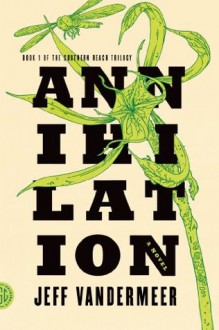
"Annihilation" is a deeply disturbing exploration of the truly alien. It's a difficult book, not because it's hard to read but because it's hard to stop, no matter how uncomfortable reading on becomes.
From the very beginning, this story is a quiet nightmare that won't let you wake up. It's a vivid hallucination with a pervasive sense of threat, a compulsion to continue and a heightened awareness of your own helplessness.
The writing is vivid, the narrator fundamentally unreliable and the nature of the narrative is literally mind-bending.
The story is told from the point of view of a member of the twelfth expedition into Area X, an all-female, four-person team made led by a psychologist (which immediately removed my trust - who puts a psychologist in charge?), and consisting of an anthropologist, a surveyor and our narrator, the biologist. What Area X is, what the mission objectives are, even why the fifth member, a linguist, dropped out is all left not just unexplained but proactively obscured.
All we see is the landscape, unspoilt apart from the things left behind by previous expeditions.
What follows is an exploration of Area X that shows the duplicity of the people sending the expeditions and the deeply alien core that defines Area X and makes the people who send the expeditions afraid.
"Annihilation" deals with the truly alien. Not the well-they're-a-little-like-us-except-they-do-this- and they-think-that-and-they-look-funny. What we and our narrator come to understand is that the truly alien is unknowable. It is literally incomprehensible.
The more we are driven by a curiosity sharpened by scientific method and the habitual identification of patterns and the garnering of knowledge, the more painful it is to be confronted with the obviously present but incomprehensible.
That kind of contact forces us to look inwards, towards the familiar, the known, the human, so that we can tear our vision from the insanity-inducing contact with something that we cannot process.
Our narrator, The Biologist (we never learn her name but we know that she tolerates her husband calling her Ghost-Bird, a reference to her emotional distance and disengagement with the people around her) has the perfect background for encountering the alien and still having the potential to survive. She is someone with a strong, although not necessarily positive, sense of self, who has, since childhood, preferred solitude and welcomed the opportunity to slide her consciousness into a deep embrace with whatever ecosystem she is studying The Biologist is an Uber-introvert who is highly resistant to and suspicious of, outside influence.
Early in the book, in the journal she records this narrative in, she comments:
That’s how the madness of the world tries to colonize you: from the outside in, forcing you to live in its reality.
The telling thing here, I thought, was the Biologist's view that we choose the reality that we live in.
It soon becomes clear that The Psychologist and the people who sent the team on this mission have taken steps to shape the reality the team sees, even going as far as to implant strong hypnotic suggestions. That our narrator spots and resists this seems to central to her character. She is someone who naturally joins teams or shares her life. Her Ghostbird nickname was earned in part because of her inability to share herself with her husband. At one point, she writes in her journal:
It may be clear by now that I am not always good at telling people things they feel they have a right to know,
The biologist has a gift for letting her focus widen, letting her mind still and waiting for patterns to emerge. She is someone for whom imagination and knowledge are both routes to understanding. This changes the way she sees Area X and gives her a perspective previous expeditions have not been able to achieve.
When she thinks about the motivations of her superiors, who send the expeditions, she comes to the conclusion that, while they perceive Area X alien and threatening, they are unable to let themselves fully understand what that means and so have become locked in a pattern of behaviour that does not offer a way forward. She says:
our superiors seemed to fear any radical reimagining of this situation so much that they had continued to send in knowledge-strapped expeditions as if this was the only option.
I found The Biologist as fascinating as Area X. I can see that her dispassion, her tendency to obsess, her ability to be so fully present in the moment that she fades into it, and her emotional toughness would make her seem strange to many, but she is not alien, only different.
When making life or death decisions in the face of imminent personal threat, she says:
You can either waste time worrying about a death that might not come or concentrate on what’s left to you.
I admire the pragmatism of that. Yet she is not an emotion-free logician but rather is driven by an emotional connection with the world around her. Her scientific training as a biologist provides with a mother-tongue but it is her connection with her environment that turns the words into poems.
She has often failed to have her field assignments renewed because her form of focus is seen as a lack of discipline. She says:
I had gotten sidetracked, like I always did, because I melted into my surroundings, could not remain separate from, apart from, objectivity a foreign land to me.
The Biologist's up close and personal encounter with the animus of Area X is mind-bending and beautifully wrought. There are no easy answers here, only a recognition of our limited ability to know and the dangers of trying to exceed those limitations. She describes part of the encounter by saying:
But the longer I stared at it, the less comprehensible the creature became. The more it became something alien to me, the more I had a sense that I knew nothing at all—about nature, about ecosystems...
...And if I kept looking, I would have to admit that I knew less than nothing about myself as well, whether that was a lie or the truth
I particularly like the last clause. The Biologist is never in doubt that reality is more malleable than truth.
I highly recommend this book if you're in the mood for a thoughtful and sometimes challenging read, filled with strong emotion and beautiful prose.

 Log in with Facebook
Log in with Facebook 







